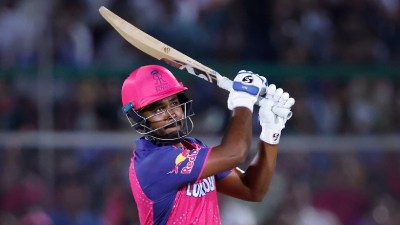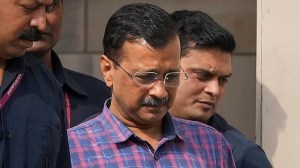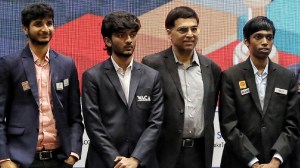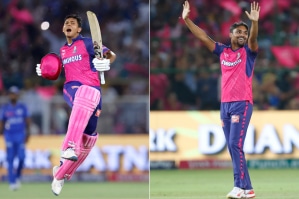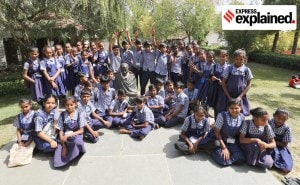- India
- International
‘The person who speaks the least in Cabinet meetings is the Prime Minister’
Union MoS for Culture, Tourism and Civil Aviation, Mahesh Sharma explains the delay in formulating civil aviation policy, praises PM, and argues 'achhe din' can’t be measured by one yardstick
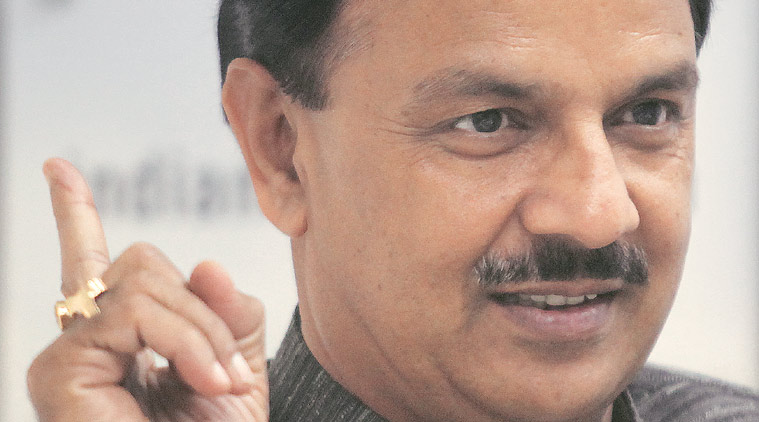 Maneesh Sharma is an MP from Gautam Buddha Nagar in Uttar Pradesh, a crucial constituency located next door to the Capital.
Maneesh Sharma is an MP from Gautam Buddha Nagar in Uttar Pradesh, a crucial constituency located next door to the Capital.
Why Mahesh Sharma
The first-time MP was not only given Independent charge of two crucial portfolios in the NDA government, but Prime Minister Narendra Modi has also entrusted him with looking after his own constituency of Varanasi. As Minister for Culture, Sharma looks after one of the subjects held very dear by the RSS and its affiliates. He is an MP from Gautam Buddha Nagar in Uttar Pradesh, a crucial constituency located next door to the Capital
Maneesh Chhibber: Can you tell us something about the one year of the Narendra Modi government?
The one thing this government has given to the nation — though I can give a list of 100 items — is respect of India and Indians in the world.
This has gone up much higher in this one year since Independence. The faith of the common man and Indian diaspora in the governance system, in politicians — something that was lost, especially in the last 10 years — has also increased. People thought that they had reached a point of no return. Now a sea change has come — there is transparency in the working system, a largely corruption-free environment, etc. The ministers, officers and politicians are cautious that nothing should happen which can bring a bad name. In the last one year, not one event has happened which would put a black spot or label on any politician.

Some people are asking, where are the achhe din. ‘Why have they not started yet?’. But can there be a yardstick, a measuring scale for achhe din? The issues being raised (by the government) concern 90 per cent of the population — farmers, labourers, the common man who sells tea. And yet, the Opposition says we are a government for corporates and questions our social reforms. The insurance scheme, the Atal Pension Yojana, Beti Padhao Beti Bachao Yojana, Sukanya Samriddhi Yojana, are these schemes meant for Anil Ambani’s daughter or son? Or Adani’s family members?
If you talk of the land acquisition Act, the Congress had ample time to do something about land reforms. At the fag end of their government, they brought in a law. We agree we were a part of that law. And then when we saw that, in the last one and a half year or so, not even an inch of land had been acquired for any cause, we started pondering as to what needed to be changed. We brought it to the knowledge of the farmers, but maybe we failed in carrying the message down the line to the farmers. And then we faced the reactions.
On GST, there was a consensus among all (state) governments, but still just to fall in line with the Opposition’s thought process, we sent it to parliamentary committees, etc. We honoured their sentiments and invited them to give suggestions.
Maneesh Chhibber: You talked about achhe din and the unreal expectations. But did the PM himself not raise the bar and people’s expectation when he said, ‘Achhe din ab aa gaye hain’? So when the government tells people to wait, is it not going back on its claims?
Yes, achhe din started the day this government took over. The faith of the common man, the public has been established in this government.
The oath-taking ceremony started with building relations with the SAARC countries, transparency in the working style has been brought in, inflation rate has started falling. Any genuine person would accept that it was not possible to bring these changes in days or hours.
There is an essence behind the PM saying that achhe din have already started. Can everything be settled in one day? Then why the mandate for 60 months? The government has been given a mandate for 60 months. In these 60 months, the ball has started rolling. The results and outcomes of that process have started coming. A sum of Rs 2 lakh crore has come in as revenue from the coal auction to the exchequer, for example.
Besides, not a single finger has been raised, not one question has been asked, regarding the integrity of any minister, unlike earlier, when news would be full of scandals running into crores.
Some MPs have made some loose comments, but nobody appreciated that. The PM did not appreciate that.
Faith has been revived in governance from zero day of this government. Of course, we’ve inherited rotten systems of the last 60 years, it will take time to change that, it can’t be changed overnight, or else the system will react to it.
The results of the various ministers have started coming, but they will be measurable in another two years or so.
Abantika Ghosh: You are a doctor. The government recently withheld a decision to print 85 per cent pictorial warnings on tobacco products, and on the recommendation of a committee that is not binding on the government. What’s your view?
As soon as this issue was brought to the PM’s knowledge, our health minister came out and made a categorical statement in front of the media that we are against tobacco. We will take a decision and will implement it without any pressure from tobacco groups. There are all sorts of groups — tobacco groups, liquor groups. But the more important problem our country is going to face is food adulteration and drug adulteration, not tobacco or liquor.
Avishek G Dastidar: How important is the Culture Ministry in this government?
What is the strength of this country in the world? In a film, it was said, ‘Mere paas maa hai’. I say, ‘Mere paas rich cultural heritage hai’. The world is looking at India’s culture — yoga, three generations of families cooking in the same kitchen, the relationship between father and son. Now, the so-called European world wants us to guide them in yoga and family relations. Our culture is our soul. If we lose our culture, that’s an issue I’d raise. We have 65 per cent youth, and before they go and explore Dubai, Thailand, etc, they should explore the rich cultural heritage of my great nation. This culture should not be changed. A cultural change may not affect the US, but it will break the structure of this country, it is our binding force. So, this ministry is very close to the heart of the Prime Minister.
Sunny Sen: Can you name the specific achievements of the Culture Ministry? You are also MoS for Civil Aviation. The new aviation policy has been delayed. Where are we on that? It was supposed to be out in the first year of the Civil Aviation Ministry’s tenure.We have 39 organisations under the Ministry of Culture — the Archaeological Survey of India (ASI), National School of Drama (NSD), Sahitya Akademi, etc. Cultural achievements cannot be measured. Culture is intangible. How can you measure the work of the National Monuments Authority, the National Archives, the preservation of Indian art, craft, spirituality? The only thing that counts is our sincere process to make all these activities transparent and make the workings of artistes available online. The process has started religiously, unlike earlier when an artiste would be given Rs 25 lakh for a painting.
That was what this ministry was doing. There was an advisory committee. I saw who are the members, what was the qualification for being a member of this committee. Someone said ‘I am the morcha adhyaksh of so-and-so party’. Now names of all the members are online, they are all qualified, not members of a party etc, no one is taken who is not a master of his subject. Every process has gone online.
Civil aviation policy, yes, there is a delay there. This industry is in crisis. Worldwide, we rank ninth in the civil aviation industry. Our vision by 2020 is to bring this to No. 3. Our connectivity to Tier II or III towns, which are tourism places, has not yet started. Out of 125 airports, only 18 are functional, 45 are lying as they are.
The 5:20 rule (which requires a domestic airline to have 20 aircraft and at least five years of operations to start flying on international routes) is still in the process of being addressed. On our national carrier — everybody says the Civil Aviation Ministry means Air India ministry — there are so many burning issues. So we have left it to public opinion, and we have intentionally delayed it for some time. Once this policy comes in, it will address all these issues.
Shobhana Subramaniam: When do you see Air India making profits? Every year, it makes Rs 4,500 crore of losses on an average and the government puts in around Rs 4,500 crore of equity under the 10-year restructuring plan.
It’s my pain also. The losses are more than Rs 4,500 crore annually. We got a legacy, Rs 50,000 crore of debts, Rs 39,000 crore of accumulated losses and around Rs 6,000 crore of annual losses. Maybe it will be for the first time in 10 years that it will make an operational profit, though maybe not much.
My seed capital when I started my own venture was Rs 600. So, using my enterprising experience, I have put a challenge to my people to bring around our national carrier. Maybe it will start in a year or so. Still, so much debt can’t be cleared in one year or three years.
We can take a call, offload Air India or disinvest or privatise, but then I see the wonderful work that the airline has done — in Nepal, Jammu and Kashmir, Yemen, etc.
Coomi Kapoor: What was the reason for the sudden removal of Venu Vasudevan, director-general of the National Museum, in the middle of his tenure? The decision has rattled the artistic community, as Vasudevan was known to be innovative and efficient.
I don’t say he was a bad person. He had brought a good name to the museum, done good things. But there is a routine process of transfers. It being in the middle of his tenure doesn’t matter. Also let me tell you the person you are naming was not the director of the museum. He was the administrator. He had been given charge of director. He was never the director. As an administrator, he did good work. There was nothing negative about his transfer. That post was vacant two years ago too, it’s still vacant.
A person has been identified, he may be better. We are in search of better than the best.
Avishek G Dastidar: One of your assignments had been overseeing the Delhi elections. Specifically the Krishna Nagar constituency. What went wrong? Also, what are your views on the row the Delhi government finds itself in now? And do you think the Aam Aadmi Party has influence in Noida, your backyard?
Everybody got it wrong in Delhi. All the expectations, forecasts were proven wrong, whatever be the reason. Not only was it a surprise for Arvind Kejriwal, but also for us and for you, the media.
But now I think Delhi people are cursing their choice. Maybe it was all the gimmickry, that ‘I will give you this, I will give you that’… It’s not possible. They don’t have any experience of governance. I’m honest, I’m supposed to be honest, as per the Constitution of India. The question is whether all the 66 people working with you are cut from the same cloth.
As for Noida and Greater Noida, they are a different cup of tea. Here people are of a different class. In the past too, they couldn’t make an impact here, though Prashant Bhushan, Kumar Vishwas, Yogendra Yadav all lived here. The bubble has burst.
Shubhajit Roy: The Narendra Modi Cabinet is perceived to be a rubber-stamp cabinet, that the word of only one man counts. How much are you able to speak your mind in Cabinet meetings? Who talks the most?
There are two types of rubber stamps — self-inking, and one with the stamp and the pad separate. Which stamp are you talking about? I am an old-timer, I believe in the second type. If there is no ink pad, the stamp doesn’t work. We are working like that.
I’ve been a part of those ministerial meetings, and let me tell you the person who speaks the least in those meetings is the Prime Minister. And people can say anything they want there. If somebody is not competent, that is a different matter. The PM says anybody can discuss anything they want, but it should not go out of this room. I think that is right. But there is liberty for anyone to say what they want.
Pradeep Kaushal: You belong to the same party as Sakshi Maharaj, and you are a doctor. How many children do you think each Hindu should have?
I’m also a proud Hindu. We have only limited resources, natural or otherwise. We are depleting our resources. As per the demand of the time, the number of children needs to be controlled. Otherwise, what is our strength will become our weakness. We will fall short of resources, there will be infighting. One or two is enough.
Sagnik Chowdhury: As a Culture Minister, do you think the beef ban in Maharashtra is an attack on our cultural diversity?
India is the only nation that has linked all the things it loves to the mother: Bharat Mata, Ganga Mata, Tulsi Mata, Gau Mata. No one says France Mata, Pakistan Mata, America Mata. You or I haven’t given these names. No one even remembers when this started. There was a reason. Why cow? Why not buffalo, or goat? We take milk from so many other resources too. But there is something specific about Gau Mata.
When this country was born in 1947, you must have heard that this was a nation of 33 crore devi, devta. That time the country’s population was 33 crore, and maybe each one had an animal as its share. Now the population has increased four times, while animal numbers have fallen to one-fourth.
Fifty-five per cent of the milk we drink is adulterated. Scientifically it has been proven that there is a lot of difference between a cow’s milk and a buffalo’s milk. And if it is our strength, our binding force, that we consider cow’s milk as equivalent to a mother’s milk, if I allow such an animal to be slaughtered today, where will it end? Today 50 per cent of our milk is adulterated, tomorrow it will be 75-80 per cent. We have to put a ban somewhere.
And if it is something to which my emotions are attached — 80 per cent, 90 per cent of the population’s emotions —then in the name of diversity, would you want to do something that only 2-5 per cent of the population wants? Or would you like to respect the sentiments of your 80-90 per cent?
Maneesh Chhibber: Why do you think the PM has given you the charge of Varanasi, his constituency? And how much of control does the RSS have over the Culture Ministry?
I come from an RSS background, and I am proud of that. The RSS has shown me my way of life, and the sense of belonging to my nation. The PM has given me the responsibility of going to Varanasi once a month. Varanasi is the cultural, spiritual seat of India. Everyone around the world wants to visit the city once in their lifetime. I am with the Culture Ministry, so he has rightly chosen me for the job. Who else could have been chosen?
As for interference of the RSS in day-to-day activities, I keep meeting my RSS mentors, I take suggestions, guidance from them, I am allowed to do that. I am amazed at the amount of information they have, especially for my Ministry of Culture. That’s unmatched, that is not there with anyone. If I had to take 100 members for all fields — sitar, Kathak, Bharatanatyam — they will never interfere. They make a suggestion, I try to incorporate it, but I also speak my mind and they don’t protest.
If you call this a takeover of my ministry by the RSS, it’s not.
Irena Akbar: You said that respect for India in the world has gone up in the one year of this government. The PM also recently said that Indians were earlier ashamed of their country. His comment has drawn a lot of flak for implying that Indians had nothing to be proud of till his government came into being.
I’m proud of being Indian today, I’ll be proud tomorrow, and I was proud yesterday also. But compare the pride you feel in being Indian today to a year back when everything of yours was under question. You were labelled a corrupt, unclean country, with no governance. Did you feel proud of that? Or are you feeling proud today? What the PM has said, that was the essence behind it — that I’m a proud Indian today and that there were things that shamed us a year back worldwide. I have nothing to be ashamed of in what he said.
Apr 23: Latest News
- 01
- 02
- 03
- 04
- 05











